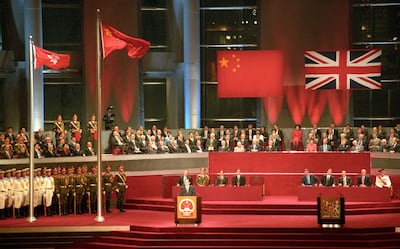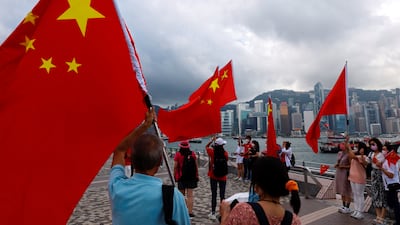Hong Kong's days as a buccaneering outpost of Britishness in the East are coming to a close. Some of the harshest Covid-19 policies implemented anywhere and the final passing in 2020 of national security legislation that the territory's Basic Law had mandated ever since 1997, have contributed to an exodus of 150,000 people from January to late March this year.
That is more than five times the net outflow for all of 2021, according to a Bloomberg report. So many highly paid expats are leaving that second-hand cars are going for a song. Joining them are the UK Supreme Court president Robert Reed and his deputy Patrick Hodge, who have announced they will no longer sit on the city's Court of Final Appeal.
At conferences in the region many have heard delegates from China insist for years that "Hong Kong is just another Chinese city". More and more, that is becoming a reality – and this isn't just because its GDP now makes up less than 3 per cent of China's (compared to one quarter in 1993).
Is there anything wrong with that destiny? As someone whose parents come from two European liberal democracies, Ireland and the UK, I can certainly feel sympathy for people who mourn the changes in the political culture, particularly, in the "jewel of the East".
But they were also inevitable. Let's not forget that there is another Chinese city that was once heavily influenced by foreigners – Shanghai – with a special international settlement that had extraterritoriality and consular jurisdiction. It had its own fire service, police force and military reserve. British, American, French and Japanese troops were all stationed in the city between the two world wars, with the UK and US even setting up their own court systems.
Should we mourn the passing of that arrangement, which fully came to a close in 1946, too?
We don't, of course, because although that period is frequently looked at with an unmerited nostalgia – "Shanghai was exciting and risque" and "there were lots of sophisticated French people there" – we recognise that all these special provisions for foreigners constituted an entirely indefensible intrusion on Chinese sovereignty by outsiders. The concessions were forced on China by colonial powers.
The same was true with Hong Kong, except the circumstances were far worse. The First Opium War from 1839-42 was one of the most shameful incidents in the history of the British Empire. In the name of free trade, Britain attacked China to try to make the country accept the sale of opium, which the Qing imperial court wanted to shut down. China had to cede Hong Kong after surrendering; Kowloon Peninsula followed after the Second Opium War in 1860, while Britain demanded and received a 99-year lease on the New Territories in 1898.

That these were "unequal treaties" and part of China's "century of humiliation" at the hands of outside powers is in no doubt. Britain's possession of Hong Kong may have been regarded benignly in the West some 40 years ago, but I doubt if anyone wants to attempt a defence of 19th-century imperial expansion today.
The colony was returned to China in 1997, and at this point many will complain that Beijing has not kept to one of the key points of the 1984 Sino-British Joint Declaration, the "one country, two systems" principle that would have left Hong Kong's way of life in place until 2047. This is at least partially debatable. Even a UK House of Commons briefing concedes that the Hong Kong Special Administrative Region's government failed to keep to its obligation to pass the security legislation. But it strikes me as a strange idea that an invader should have any say over lands it eventually returns.
Imagine, by contrast, if imperial China had conquered a British island 150 years ago, but later admitted the absurdity of the proposition that a land mass in the English Channel should belong to a country on the other side of the world, and agreed to relinquish it, also in 1997.
If Chinese judges continued to sit on this fictional island's court 20 years later, people would ask what on earth they were still doing there, and if Beijing kept on making critical statements about its governance, British public opinion would be outraged. Some may find it hard to see now, but I'm sure that 50 years on it will seem quaint, to say the least, and more likely a neo-colonial hangover, that Britain claimed the right to demand huge influence over Hong Kong after the former colony was handed back.
I acknowledge that if I lived there, it is highly probable that I would not be too happy with the changes of the past few years. But then I would be yet another European living in a city that was not my home.
The whole edifice of Hong Kong the trading super-city may have been wondrous in many ways, but it was all constructed on a wrong that was done to China. That is forgotten too easily by people whom one suspects wish Britain had never had to leave in the first place. Now it is for the Chinese to decide its future – as it always should have been.


